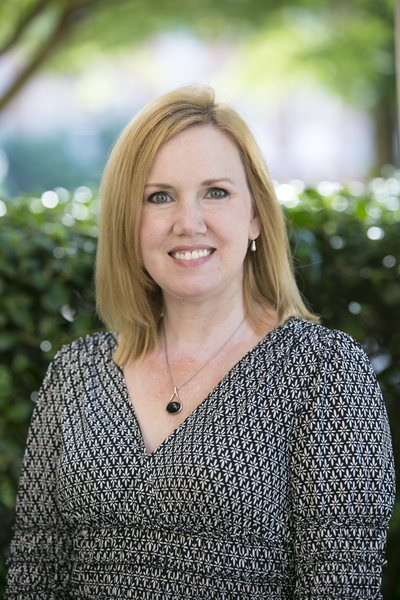
Prior to joining the staff of Samford University’s Center for Congregational Resources (CCR) in 2011 as its program manager, Keri Burns was unsure of what her future held. Holding onto her faith in God and his purpose for her life, Burns joined the CCR to help cultivate her personal passion for helping churches. Now Burns leads the center as its director and she’s more fueled than ever to expand upon its success.
Burns commented, “My previous vocational experience was not in a ministry-related field. Once I grew into the role, I was overwhelmed with the vast nuances in faith traditions. Though I grew up in the church, my experience was quite narrow. Stepping into my first role at the center was a steep learning curve, but it wasn’t long before I realized how much I loved the work. I have had the pleasure of meeting clergy and congregational leaders from every denomination across the state, many whom I now count as dear friends.”
Now as the center’s director, Burns’ will continue to focus on developing relationships with clergy and congregational leaders across the state, as well as maintaining relationships with potential funding sources which is vital to the center’s work.
The majority of the center’s programming is directly tied to grant initiatives from the Lilly Endowment. Depending on the overarching goals of the initiatives, the programming will vary. Burns elaborated on the grants, saying, “We have had grants that provided resourcing for congregations, walking alongside clergy and congregations as they explore Christian calling, both individual and communal, and currently aiding congregations as they navigate change and opportunities for growth for their churches. The work and programming shifts overtime with a different focus or directive, but what remains the same is the honor of working with congregations, who in the face of vast social and economic change, are dedicated to continuing to serve their communities.” These grants have allowed Burns, the center, and Samford students to foster deep-rooted connections with other communities around the state.
Burns has never stopped learning and sees every interaction as an opportunity for growth. She reflected, “I make it my goal to learn as much as possible from the people I meet, to conferences I have attended, and from the many Samford colleagues who have accompanied me on this journey.” To greater enhance the role of the center in the community, Burns has enrolled in Beeson Divinity School to purse a Master of Arts in Theological Studies to deepen her own professional development and her understanding of ministry. She has also been accepted into the Foundations of Christian Leadership program through Leadership Education at Duke Divinity School. The one year cohort is designed for people who are in their first five years in a leadership position in a Christian institution.
The Center also supports clergy who are seeking Sabbath or Study-Leave grants, and actively work with clergy to prepare a dedicated time away from ministerial duties to rest, restore and renew. Burns continues to emphasize the unique intricacies of the center and how Samford is making in a variety of churches. She said, “With clergy and congregations across the state and across denominational lines, we feel is a direct reflection of the mission, vision, and values of Samford. We have student workers who are closely involved in the programming, we enlist the expertise of Samford faculty, and receive uplifting support from the administration. Through programming, we walk alongside communities of faith as they navigate changes in various contexts. We see them develop creative and innovative programming. It’s a privilege to offer a respite opportunity to clergy. As I grow into my new role, I hope to embrace new ideas, even new technologies, to support those in ministry.”
Looking towards the future, Burns aspires to drive deeper connections throughout the churches they assist, as well as foster stronger relationships within the campus community. She not only wants to encourage clergy and congregations to see beyond what has defined them in the past, but also encourages more collaboration with her Samford colleagues as well. Keri said, “In my short time as interim and now director, my priority was to work with other colleagues on campus. A pastor and dear friend of mine once said, ‘if you find there isn’t room at the table, get a bigger table.’ That’s my approach: we are stronger together.”
